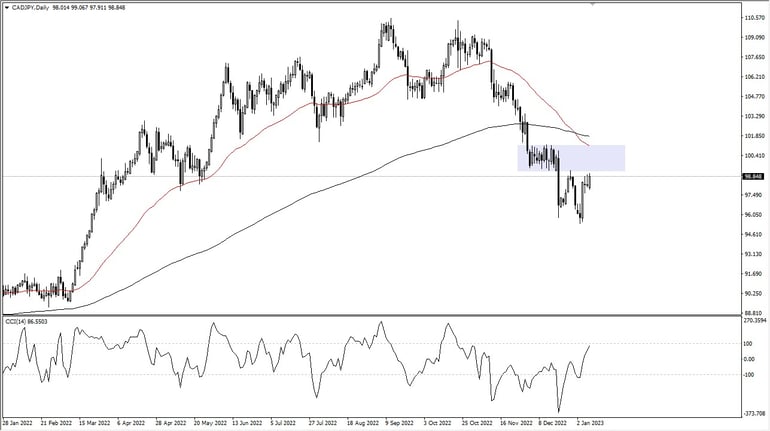
The CAD/JPY pair is going to be an interesting market to watch over the next several weeks, as there are a lot of external factors built into it. The most obvious correlation is going to be that the Canadian dollar is highly levered to the crude oil market, which is seeing a lot of noise. Recently, crude oil has picked up a bit, but had been in an extraordinarily bearish trend for several months.

Further exacerbating the situation is that the global demand picture for crude oil is rather soft. In that environment, it’s difficult for Canada to see its currency rally, especially considering that there is a major housing bubble in Canada that is starting to pop. In other words, the Canadian dollar has a lot of issues around it. However, any time you trade currency pair, you need to keep both currencies in mind.
The Japanese yen is interesting as the Bank of Japan has recently set a cap on yields at 50 basis points. This was after defending the 25 basis point level for most of 2022, which was a main driver of why the Japanese yen lost strength. As those yields rose toward the 25 basis point level, the Bank of Japan was forced to print more yen, in order to buy bonds as the yield and the price of bonds are inversely correlated. In other words, more supply of Japanese yen was thrown into the market. While the Bank of Japan was involved in quantitative easing, almost every other central bank around the world was tightening. As a result, the Japanese yen was pummeled.
Fast forward to today, and now you have the Canadian dollar trying to find its footing against the Japanese yen. However, it’s worth noting that there was a significant drop off in this pair near the ¥100 level, and it appears that there is a big block of selling pressure between there and the ¥100.50 level. Furthermore, the Commodity Channel Index is rapidly approaching the overbought condition, so one would assume that there should be selling pressure above. However, if the market were to clear ¥100.60, then it would show a major turnaround in this pair and strength by the Canadian dollar. This would more likely than not coincide with oil rallying at the same time.
Trading foreign exchange on margin carries a high level of risk, and may not be suitable for all investors. Before deciding to trade foreign exchange you should carefully consider your investment objectives, level of experience, and risk appetite.
Nothing contained in this website should be construed as investment advice. Any reference to an investment's past or potential performance is not, and should not be construed as, a recommendation or as a guarantee of any specific outcome or profit.
